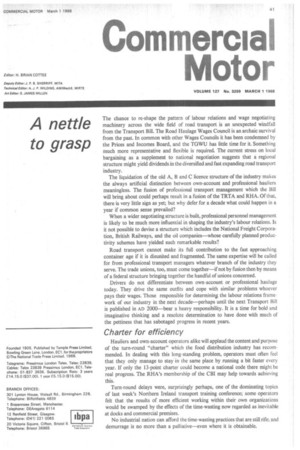A nettle to grasp
Page 43

If you've noticed an error in this article please click here to report it so we can fix it.
The chance to re-shape the pattern of labour relations and wage negotiating machinery across the wide field of road transport is an unexpected windfall from the Transport Bill. The Road Haulage Wages Council is an archaic survival from the past. In common with other Wages Councils it has been condemned by the Prices and Incomes Board, and the TGWU has little time for it. Something much more representative and flexible is required. The current stress on local bargaining as a supplement to national negotiation suggests that a regional structure might yield dividends in the diversified and fast expanding road transport industry.
The liquidation of the old A, B and C licence structure of the industry makes the always artificial distinction between own-account and professional hauliers meaningless. The fusion of professional transport management which the Bill will bring about could perhaps result in a fusion of the TRTA and RI-IA. Of that, there is very little sign as yet; but why defer for a decade what could happen in a year if common sense prevailed?
When a wider negotiating structure is built, professional personnel management is likely to be much more influential in shaping the industry's labour relations. Is it not possible to devise a structure which includes the National Freight Corporation, British Railways, and the oil companies—whose carefully planned productivity schemes have yielded such remarkable results?
Road transport cannot make its full contribution to the fast approaching container age if it is disunited and fragmented. The same expertise will be called for from professional transport managers whatever branch of the industry they serve. The trade unions, too, must come together—if not by fusion then by means of a federal structure bringing together the handful of unions concerned.
Drivers do not differentiate between own-account or professional haulage today. They drive the same outfits and cope with similar problems whoever pays their wages. Those responsible for determining the labour relations framework of our industry in the next decade—perhaps until the next Transport Bill is published in AD 2000—bear a heavy responsibility. It is a time for bold and imaginative thinking and a resolute determination to have done with much of the pettiness that has sabotaged progress in recent years.
Charter for efficiency
Hauliers and own-account operators alike will applaud the content and purpose of the turn-round "charter" which the food distribution industry has recommended. In dealing with this long-standing problem, operators must often feel that they only manage to stay in the same place by running a bit faster every year. If only the 13-point charter could become a national code there might be real progress. The RHA's membership of the CBI may help towards achieving this.
Turn-round delays were, surprisingly perhaps, one of the dominating topics of last week's Northern Ireland transport training conference; some operators felt that the results of more efficient working within their own organizations would be swamped by the effects of the time-wasting now regarded as inevitable at docks and commercial premises.
No industrial nation can afford the time-wasting practices that are still rife; and demurrage is no more than a palliative—even where it is obtainable.








































































































































































